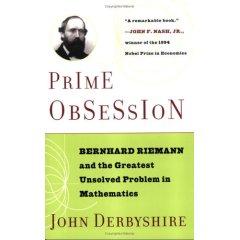| 2020ok Directory of FREE Online Books and FREE eBooks |
Free eBooks > Prime Obsession: Bernhard Riemann and the Greatest Unsolved Problem in Mathematics
Prime Obsession: Bernhard Riemann and the Greatest Unsolved Problem in Mathematicsby John Derbyshire  Download Book (Respecting the intellectual property of others is utmost important to us, we make every effort to make sure we only link to legitimate sites, such as those sites owned by authors and publishers. If you have any questions about these links, please contact us.) link 1 About Book Amazon.com Bernhard Riemann was an underdog of sorts, a malnourished son of a parson who grew up to be the author of one of mathematics' greatest problems. In Prime Obsession, John Derbyshire deals brilliantly with both Riemann's life and that problem: proof of the conjecture, "All non-trivial zeros of the zeta function have real part one-half." Though the statement itself passes as nonsense to anyone but a mathematician, Derbyshire walks readers through the decades of reasoning that led to the Riemann Hypothesis in such a way as to clear it up perfectly. Riemann himself never proved the statement, and it remains unsolved to this day. Prime Obsession offers alternating chapters of step-by-step math and a history of 19th-century European intellectual life, letting readers take a breather between chunks of well-written information. Derbyshire's style is accessible but not dumbed-down, thorough but not heavy-handed. This is among the best popular treatments of an obscure mathematical idea, inviting readers to explore the theory without insisting on page after page of formulae. In 2000, the Clay Mathematics Institute offered a one-million-dollar prize to anyone who could prove the Riemann Hypothesis, but luminaries like David Hilbert, G.H. Hardy, Alan Turing, André Weil, and Freeman Dyson have all tried before. Will the Riemann Hypothesis ever be proved? "One day we shall know," writes Derbyshire, and he makes the effort seem very worthwhile. --Therese Littleton From Booklist Bernhard Riemann would make any list of the greatest mathematicians ever. In 1859, he proposed a formula to count prime numbers that has defied all attempts to prove it true. This new book tackles the Riemann hypothesis. Partly a biography of Riemann, Derbyshire's work presents more technical details about the hypothesis and will probably attract math recreationists. It requires, however, only a college-prep level of knowledge because of its crystalline explanations. Derbyshire treats the hypothesis historically, tracking increments of progress with sketches of well-known people, such as David Hilbert and Alan Turing, who have been stymied by it. Carrying a million-dollar bounty, the hypothesis is the most famous unsolved problem in math today, and interest in it will be both sated and stoked by these able authors. Gilbert Taylor Copyright © American Library Association. All rights reserved The Christian Science Monitor A math book that reads like a mystery novel. Review A math book that reads like a mystery novel. (The Christian Science Monitor) Derbyshire’s attempt to take nonmathematicians into this subject had me on the edge of my seat. (Los Angeles Times) Riemann and his colleagues come to life as real characters and not just adjectives for conjectures and theorems. (Scientific American) Scientific American Riemann and his colleagues come to life as real characters and not just adjectives for conjectures and theorems. Washington Post, May 4, 2003 "...[this book] will reward the effort paid to [it]" Los Angeles Times, June 15, 2003 "...rewarding for those up to the challenge. Energetic and conversational, it puts one at ease." Mark Haddon in The Daily Telegraph, BOOKS OF THE YEAR column, November 22, 2003 "...mind-expanding..." The New York Sun, June 18, 2003 "...warm and witty ... a genuinely enjoyable and enlightening experience." Science, October 3, 2003 "...a remarkably accessible and deeply researched description of this fascinating problem. ... eminently successful at bringing this story to life." Mathematical Reviews, 2004 "...a nice history..." Mathematics Teacher, April 2004 "...a wonderfully lucid and captivating explanation and history of the hypothesis and of the life and times of Riemann." Book Description In 1859, Bernhard Riemann, a little-known thirty-two year old mathematician, made a hypothesis while presenting a paper to the Berlin Academy titled “On the Number of Prime Numbers Less Than a Given Quantity.” Today, after 150 years of careful research and exhaustive study, the Riemann Hyphothesis remains unsolved, with a one-million-dollar prize earmarked for the first person to conquer it. Alternating passages of extraordinarily lucid mathematical exposition with chapters of elegantly composed biography and history, Prime Obsession is a fascinating and fluent account of an epic mathematical mystery that continues to challenge and excite the world.
"The Riemann Hypothesis is one of the deepest of all unsolved problems in mathematics. Unfortunately it is difficult to state exactly what the hypothesis is. It is high time that someone would write a book explaining the hypothesis in ways understandable by ordinary mathematicians and even by laymen. Three cheers to John Derbyshire for having finally done it." "An informative, comprehensive, well written account of the unsolved problem that most mathematicians regard as the most important open problem in the field. Derbyshire not only tells the historical story behind the problem -- the people stuff -- he also includes all the mathematics needed to understand what the problem is about and how people are trying to solve it." Related Free eBooks
| Related Tags |












SEND A COMMENT
PLEASE READ: All comments must be approved before appearing in the thread; time and space constraints prevent all comments from appearing. We will only approve comments that are directly related to the article, use appropriate language and are not attacking the comments of others.